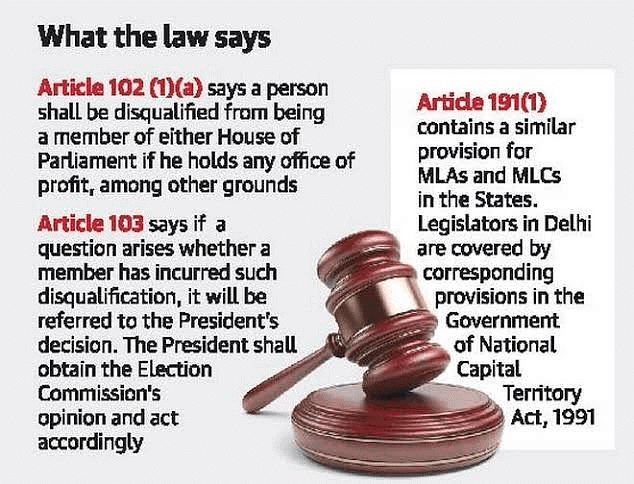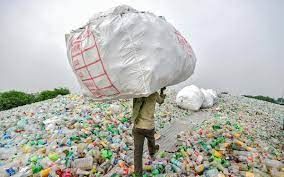UPSC Daily Current Affairs- 27th March 2023 | Current Affairs & Hindu Analysis: Daily, Weekly & Monthly PDF Download
GS-I
Water and Heritage Shield Award

Why in News?
The purpose of the Shield is to help the public become aware of the significance of water and indigenous sacred sites all over the world and the right to cultural and historical memory.
- The Sípàapu is a rocky dome made of limestone as well as a spring located on the Little Colorado river, a tributary of Colorado.
- Little Colorado joins the main stem of the river within the Grand Canyon, a UNESCO World Heritage Site.
- The ancestors of the Hopi dwelled throughout the Grand Canyon before the 1250 Common Era.
- Little Colorado, especially the confluence, is sacred not only to the Hopi but also to other Native American groups such as the Navajo and Zuni.
- The Hopi consider the Sípàapu to be the place from where their ancestors emerged from another world into this one.
About International Committee On Monuments and Sites:
- It is a global non-governmental organization associated with UNESCO
- Its mission is to promote the conservation, protection, use and enhancement of monuments, building complexes and sites.
- It is an Advisory Body of the World Heritage Committee for the implementation of the World Heritage Convention of UNESCO.
- As such, it reviews the nominations of cultural world heritage and ensures the conservation status of properties.
- It also contributed to a series of resource manuals jointly prepared by the Advisory Bodies (ICOMOS, IUCN and ICCROM) and the UNESCO World Heritage Centre.
Who are the Hopi Tribal people?
- The Hopi are known as one of the oldest living cultures in documented history, having migrated north to Arizona in the 12th century.
Source: DownToEarth
GS-II
Understanding IMF Bailouts and their drawbacks
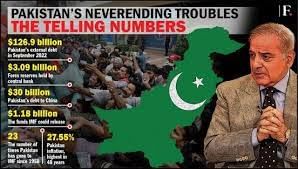
Why in News?
What is an IMF Bailout?The International Monetary Fund (IMF) last week confirmed a $3 billion bailout plan for Sri Lanka’s struggling economy. However, Pakistan failed to get a penny. Countries seek help from the IMF usually when their economies face a major macroeconomic risk, mostly in the form of a currency crisis.
- An IMF bailout, also known as an IMF program, is a loan package provided by the International Monetary Fund (IMF) to financially troubled countries.
- These loan packages come with specific terms and conditions that the borrowing country must meet to access the funds.
- They typically have a set of conditions that a country must meet to qualify for the loan package.
- These conditions, also known as “conditionalities,” typically include measures that promote fiscal discipline, monetary stability, and structural reforms to improve the country’s economic competitiveness.
- Stand-by Arrangements: They are short-term lending programs designed to provide financial assistance to countries experiencing short-term balance of payments problems. These programs typically last for one to two years and require countries to implement specific macroeconomic policies to stabilize their economies.
- Extended Fund Facility: Such programs are medium-term lending programs designed to help countries with balance of payments difficulties resulting from structural weaknesses. These programs are typically longer-term and come with more extensive policy conditionality, which requires more significant structural reforms to the country’s economy.
- Rapid Financing Instrument: It is a loan program designed to provide quick financing to countries facing an urgent balance of payments need. The program is designed to be more flexible than other IMF programs, with fewer conditions and a shorter application process.
- Countries need IMF bailout when their economies face major macroeconomic risks, such as a currency crisis, due to gross mismanagement of the nation’s currency by the central bank under the covert influence of the ruling government.
- Such currency crises cause a rapid rise in the overall money supply, which causes prices to rise across the economy and the exchange value of the currency to drop.
- Bad luck such as a decrease in foreign tourists can also contribute to a crisis in a country like Sri Lanka.
IMF programs provide several benefits to countries in financial distress. For instance:
- Access to funding: An IMF bailout provides immediate funding to a country experiencing a financial crisis, allowing it to meet its immediate financial obligations.
- Credibility push: A bailout can provide credibility to a country’s economic policies, signalling to international investors that the country is taking the necessary steps to restore its economy.
- Assistance with structural reforms: IMF programs require countries to implement structural reforms that can help address the underlying problems that led to the financial crisis, improving the country’s long-term economic prospects.
- Harsh austerity measures: IMF programs often require countries to implement strict economic policies, which can be unpopular and difficult to implement.
- Limited resources: The IMF has limited resources, which can limit the amount of assistance it can provide to countries in need.
- Stigmatization: Bailout can stigmatize a country in the eyes of international investors, signaling that the country is unable to manage its own economy without outside assistance.
Source: The Hindu
Disqualification of a MP: Constitutional and Legal Issues
Why in News?
DetailsA Member of Parliament (MP) was found guilty in a defamation case and given a two-year prison sentence by a Surat district court.
- A Member of Parliament who is found guilty of any crime and receives a term of at least two years is automatically disqualified from holding public office, according to Section 8(3) of the Representation of the People (RP) Act 1951, which governs a legislator's removal from office.
- The Supreme Court's ruling in the Lok Prahari case from 2018 is also underlined by experts. The ruling stated that if the conviction is suspended on appeal, the disqualification will also remain suspended.
- Constitutional law expert P.D.T. Achary claims that because the court stayed the MP sentence for 30 days, the disqualification process is also on hold for the same period. The disqualification is closely related to the sentence's severity, he claims.
- According to the RP Act and its interpretation by the Supreme Court in the Lily Thomas case, the disqualification is automatic because the court postponed the punishment rather than the conviction, claims former Chief Election Commissioner S.Y. Quereshi.
- In the Lily Thomas case (2013), the Supreme Court dismissed Section 8(4) of the RP Act, which allowed a legislator who had been convicted of an offence to continue serving on the basis that an appeal had been submitted within three months of the conviction.
- The disqualification would not become official until the Lok Sabha Secretariat published a notification announcing the vacant seat, and the Election Commission (EC) then ordered new elections to fill the seat.
- According to sources within the Lok Sabha secretariat, there are currently no plans to declare the MP seat vacant and they are awaiting a formal complaint.
- The secretariat is proceeding cautiously in light of the recent case involving a Lakshwadeep MP.
- In January 2023, an MP was charged and convicted by a Lakshadweep court, but a week later, the Kerala High Court suspended the verdict and declared the MP's suspension from the Lok Parliament no longer applicable.
- The Election Commission's decision to declare byelections in his constituency was immediately challenged in the Supreme Court, and the court requested that the EC decision be withdrawn.
- To suspend the disqualification order, the MP needs to get his conviction stayed by a higher court.
- The MP can also approach the President as a different alternative. According to Mr Achary, the President would decide whether to disqualify an MP based on the provisions of Article 103 of the Constitution after consulting with the Election Commission.
- A person's reputation is damaged when false comments about them are spread about them, according to the dictionary definition of defamation.
- Defamation is the purposeful, intentional, and knowing publication or utterance of a false and untrue statement with the intent to harm another person's reputation.
- A man's reputation is considered to be his property, and any damage to it is illegal. It could be spoken or written. Libel refers to defamatory written, printed, or typed content or images, whereas slander refers to defamatory spoken language.
- The Constitution's Article 19 grants its citizens several liberties. Yet, the reasonable exemption to the freedom of speech and expression guaranteed by Article 19(1) has been imposed by Article 19(2). Among the exceptions include contempt of court, defamation, and incitement to commit a crime.
- Defamation is an offence under both civil and criminal law.
- In civil law, defamation is penalised under the Law of Torts by imposing a penalty in the form of damages to be granted to the claimant.
- Defamation is a compoundable, non-cognizable, and bailable offence under the criminal code. So, a police officer may only arrest with a warrant that has been issued by a magistrate. According to the Indian Penal code, the offence is punishable by a simple jail term of up to two years, a fine, or both.
Source: The Hindu
GS-III
Biotransformation Technology
Why in News?
Recently, a UK-based start-up has claimed that they have developed Biotransformation technology that can alter the state of plastics and make them biodegradable.
- Biotransformation technology is a process which alters the state of plastics and make them biodegradable.
- The technology would digest the plastic packaging waste naturally with the help of microbes without leaving behind any microplastics.
- It ensures that plastic which escaped refuse streams to be fully biodegrade in the natural environment.
- Process - Plastics made using this technology are given a pre-programmed time during which it looks and functions like conventional plastics.
- After expiry and exposure to the external environment, it self-destructs and biotransforms into bioavailable wax.
- This wax is then consumed by microorganisms, converting waste into water, CO2, and biomass.
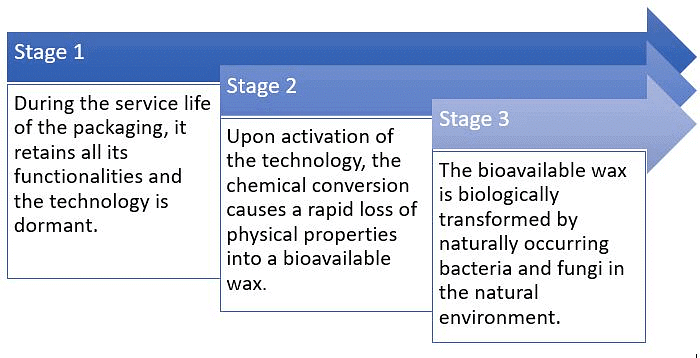
- The technology attacks the crystalline and amorphous region of the polymer structure, rapidly turning it into a wax-like material.
- This wax-like material is no longer a plastic and is not harmful to the environment.
- Utility - This technology to reduce waste can be used in the 2 prime plastic waste producing sectors - food packaging and health care.
- Indian initiatives towards plastic waste management
- Plastic waste management gazette.
- Last year, the Indian government imposed a ban on single-use plastics.
- National Dashboard on Elimination of Single Use Plastic and Plastic Waste Management.
- Extended Producer Responsibility (EPR) portal.
Source: The Hindu
Patent Evergreening

Why in News?
Indian Patent Office rejects Johnson & Johnson’s attempt to extend monopoly on manufacturing Bedaquiline in India beyond July 2023.
- This is a victory for patients fighting for wider access to crucial anti-tuberculosis drug Bedaquiline.
- Expired primary patents pave the way for generic drug manufacturers to produce Bedaquiline, thus ensuring cheaper and wider access to the drug.
- The drug has been shown to have a high success rate in treating MDR-TB, and is considered to be a significant breakthrough in the fight against this disease.
- However, the high cost of the drug has made it difficult for many patients to access it, particularly in developing countries.
- India and the US has often been at the crossheads due to Section 3(d) of Patents Act that allows for “generic competition by patenting only novel and genuine inventions.”
- US always accuses India as one of the most challenging major economies as far as IP protection and enforcement is concerned.
- Indian patents are governed by the Indian Patent Act of 1970.
- India has gradually aligned itself with international regimes pertaining to intellectual property rights.
- It became a party to the Trade-Related Aspects of Intellectual Property Rights (TRIPS) Agreement following its membership to the World Trade Organisation on January 1, 1995.
- The interesting point is that the original Indian Patents Act did not grant patent protection to pharmaceutical products to ensure that medicines were available at a low price.
- Patent protection of pharmaceuticals was re-introduced after the 2005 amendment to comply with TRIPS.
- One of the main points of contention between India and the US has been Article 3(d) of the Indian Patent Act.
- Section 3 deals with what does not qualifyas an invention under the Act, and Section 3(d) in particular excludes the mere discovery of a new form of a known substance.
- Section 3(d) prevents the mere discovery of any new property or new use for a known substance from being patented as an invention unless it enhances the efficacy of the substance repetitive.
- This prevents, what is known as “Evergreening” of patents.
- According to the Committee’s report, Section 3(d) allows for “generic competition by patenting only novel and genuine inventions.”
- The gravity of public health problems affecting developing and least developed nations must be recognized by developed nations such as the US.
- Though intellectual property protection is important for the development of new medicines but the right to protect public health and, in particular, to promote access to medicines for all is far more important.
Source: DownToEarth
Bibhutibhusan Wildlife Sanctuary
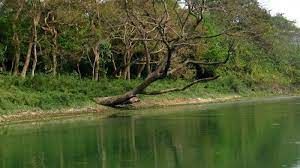
Why in News?
Recently, as many as 90 spotted deer have been brought to Sundarban Tiger Reserve from Bibhutibhusan Wildlife Sanctuary as a part of the West Bengal state forest department’s bid to decongest smaller wildlife sanctuaries.
About Bibhutibhusan Wildlife Sanctuary:
- Bibhutibhusan Wildlife Sanctuary, also known as Parmadan Forest is an animal sanctuary in the North 24 Parganas district in West Bengal.
- It is situated on the banks of river Ichamati.
Key facts about the Sundarban Tiger Reserve
- The Sundarbans is located on the delta of the Ganga, Brahmaputra and Meghna rivers in the Bay of Bengal.
- In 1973 it was declared a tiger reserve under Project Tiger.
- It is a part of the world’s largest delta and home to the largest mangrove forests.
- Flora:The vegetation of the area is moist tropical forests and tidal forests.
- Fauna:It is home to Royal Bengal Tiger, Estuarine Crocodile, Gangetic Dolphin, Water Monitor Lizard etc.
What is Project Tiger?
- It is a tiger conservation programme launched in April 1973 by the Government of India during Prime Minister Indira Gandhi's tenure.
- Aim: Ensuring a viable population of Bengal tigers in their natural habitats, protecting them from extinction, and preserving areas of biological importance as a natural heritage
Source: Indian Express
What is the Armed Forces (Special Powers) Act (AFSPA)?

Why in News?
The Union Home Minister recently said that the Centre has decided to further reduce the jurisdiction of ‘disturbed areas’ under the Armed Forces (Special Powers) Act, 1958 (AFSPA) in Assam, Nagaland and Manipur.
About Armed Forces (Special Powers) Act (AFSPA):
- It is a law enacted by the Parliament which gives armed forces (Army, the Air Force and Central paramilitary forces) the special powers and immunity to maintain public order in “disturbed areas”.
- When is it applied? It can be applied only after an area has been declared “disturbed” under section 2 of the act.
- What is a Disturbed area?An area can be considered to be disturbed due to differences or disputes among different religious, racial, language or regional groups or castes or communities.
- Who declares an area as disturbed? Section (3) of AFSPA empowers the governor of the state/Union territory to issue an official notification declaring the state or a region within as a “disturbed area”, after which the centre can decide whether to send in armed forces.
- The ‘special powers’ of armed forces under Section 4 are:
- Power to use force even to the extent of causing death, destroy arms / ammunition dumps, fortifications/ shelters / hideouts.
- Power to arrest without a warrant.
- Power to seize and search’ without any warrant any premise.
- It stipulates that arrested persons and seized property is to be handed over to the nearest Police Station with least possible delay.
- These armed forces are immune from prosecution unless Union Government provides sanction to the prosecuting agencies.
Source: Indian Express
|
38 videos|5288 docs|1117 tests
|
FAQs on UPSC Daily Current Affairs- 27th March 2023 - Current Affairs & Hindu Analysis: Daily, Weekly & Monthly
| 1. What are the subjects covered in GS-I, GS-II, and GS-III for the UPSC exam? |  |
| 2. What is the importance of daily current affairs in UPSC preparation? |  |
| 3. How can I stay updated with daily current affairs for UPSC? |  |
| 4. What is the significance of GS-I, GS-II, and GS-III in the UPSC exam? |  |
| 5. How can I effectively prepare for GS-I, GS-II, and GS-III for the UPSC exam? |  |

